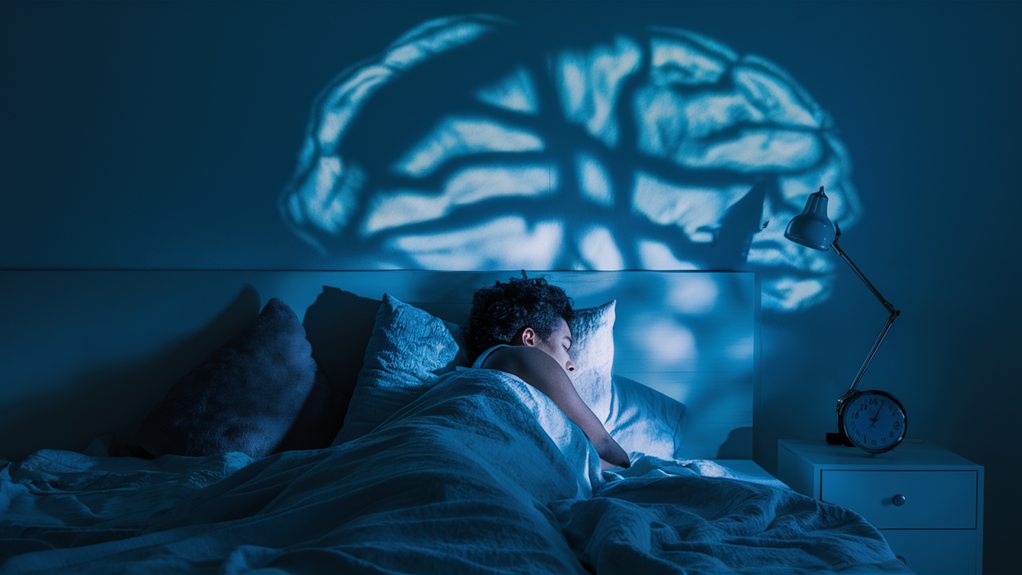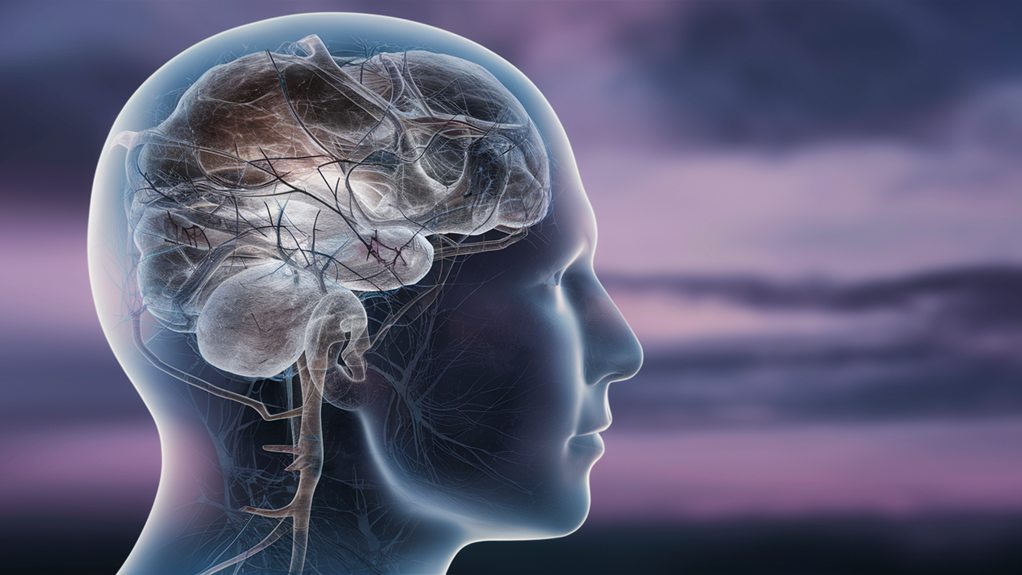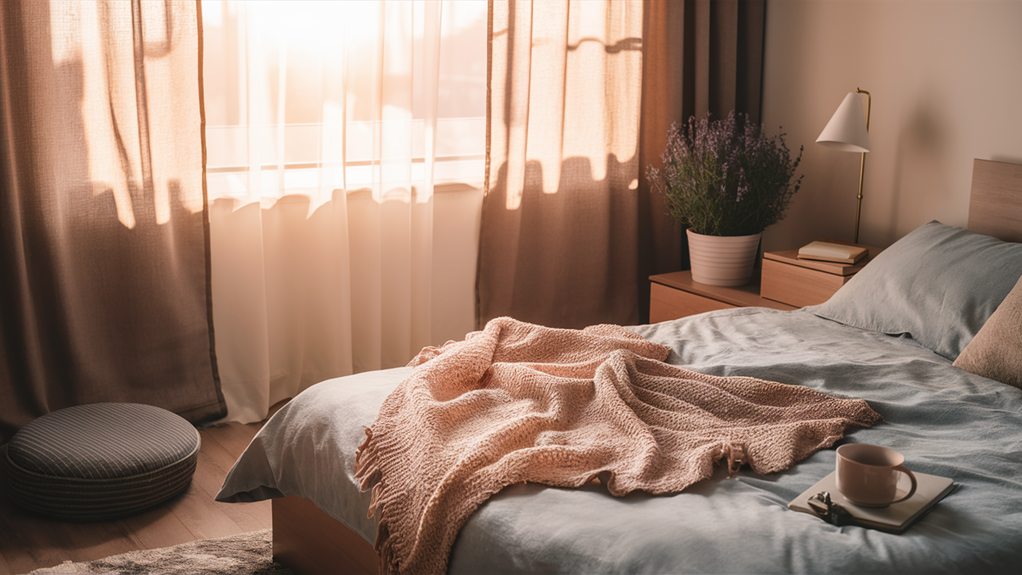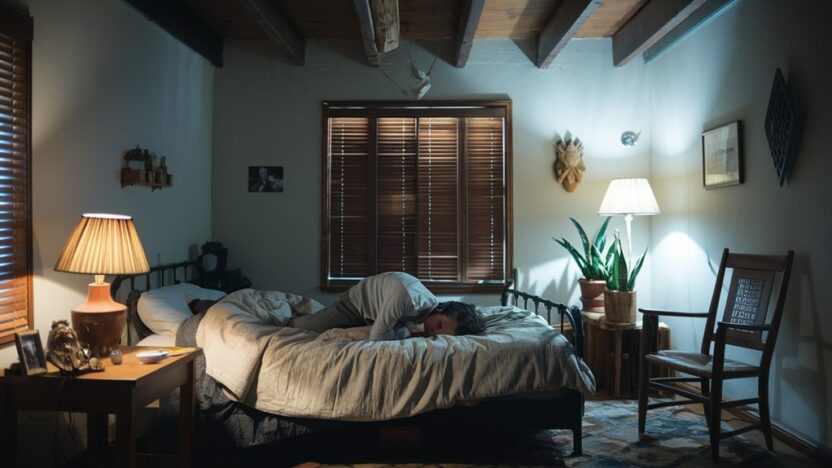Sleep and depression are closely connected, with one often influencing the other in a continuous cycle. When you're depressed, you might find it hard to fall asleep, wake up frequently during the night, or rise too early in the morning. These disrupted sleep patterns can then make your depression symptoms worse, creating a challenging loop. Your brain chemistry plays a significant role, as both sleep and mood depend on important chemicals like serotonin and melatonin. The good news is that improving your sleep habits, such as keeping a consistent schedule and creating a calm bedroom environment, can help break this cycle. Understanding the deeper connections between sleep and depression opens the door to effective solutions.
Understanding Sleep and Depression Links

Two essential aspects of mental health – sleep and depression – share a complex, bidirectional relationship. When you're experiencing depression, you'll often find yourself struggling with sleep problems, and when you're not sleeping well, you're more likely to develop depressive symptoms. Research shows that nutrition plays a significant role in both sleep quality and mood, highlighting the importance of a balanced diet in this regard the diet-sleep link.
Sleep deprivation and depression create a challenging cycle that's hard to break. You might notice that after a few nights of poor sleep, your mood starts to drop, your energy levels plummet, and your thinking becomes clouded.
Sleep and mood disorders frequently occur together, with about 75% of people with depression experiencing sleep difficulties.
The good news is that focusing on improving sleep for mental health can make a significant difference in your recovery. You'll want to establish consistent bedtime routines, create a sleep-friendly environment, and practice relaxation techniques before bed.
When you prioritize quality sleep, you're giving your brain the opportunity to regulate emotions, process daily experiences, and maintain proper chemical balance.
If you're dealing with both sleep issues and depression, it's important to address them simultaneously, as improvements in one area often lead to positive changes in the other.
Common Sleep Disruption Patterns
When depression affects your sleep, it typically manifests in several distinct patterns. The complex causes of depression, including both genetics and environmental factors, can further exacerbate sleep issues, creating a challenging cycle that impacts your daily life.
You'll notice that both insomnia and depression often work together, creating a challenging cycle that impacts your daily life. These disruptions can show up in various ways, making it difficult to maintain healthy sleep habits and affecting your overall well-being.
Common sleep disruption patterns you might experience include:
- Difficulty falling asleep at night, even when you're physically tired and have been awake all day
- Waking up multiple times throughout the night, struggling to stay asleep for extended periods
- Rising too early in the morning and being unable to fall back asleep, despite feeling exhausted
- Experiencing daytime fatigue but finding it impossible to nap or rest effectively
Your sleep patterns might shift between these different types of disruptions, and you'll often find that they're closely connected to your mood changes.
During periods of depression, you may notice that your sleep becomes increasingly irregular, with some nights being worse than others. Understanding these patterns is the first step toward developing effective strategies to manage both your sleep and depression symptoms.
The Brain Chemistry Connection

The intricate relationship between sleep and depression lies deep within your brain chemistry. When you're sleeping, your brain releases important chemicals, like serotonin and melatonin, which help regulate both your mood and sleep cycles. These chemicals work together, much like a well-orchestrated dance, to keep your mental health in balance.
Additionally, certain dietary choices can have a significant impact on your brain chemistry and overall mood, with some foods potentially impacting anxiety levels as well.
During healthy sleep, you'll go through different stages that allow your brain to process emotions, store memories, and restore its chemical balance. However, when you're experiencing depression, this delicate system gets disrupted. Your brain might produce less serotonin, the "feel-good" chemical, which can affect both your mood and ability to sleep properly.
You're actually caught in a two-way street: depression can throw off your sleep patterns, and poor sleep can worsen your depression. When you don't get enough quality sleep, your brain's ability to regulate these essential chemicals becomes compromised.
This creates a cycle where your neurotransmitters, particularly serotonin and norepinephrine, can't maintain their proper levels, making it harder for you to both sleep well and feel emotionally balanced.
Sleep Hygiene Best Practices
Breaking the cycle of poor sleep and depression starts with establishing solid sleep hygiene habits. You'll find that creating a consistent bedtime routine helps your body recognize when it's time to wind down and prepare for rest.
When you're dealing with both sleep issues and depression, it's especially important to stick to these practices, even when you don't feel like it.
To transform your sleep quality, you'll want to focus on creating the right environment and following proven strategies that support healthy rest. Your bedroom should become a sanctuary for sleep, free from distractions and designed to promote relaxation.
- Set your bedroom temperature between 60-67°F (15-19°C), as your body naturally cools down during sleep.
- Remove all electronics from your bedroom, including your phone, tablet, and TV, to minimize blue light exposure.
- Create a consistent sleep schedule by going to bed and waking up at the same time every day, even on weekends.
- Develop a calming pre-bed routine that includes activities like reading, gentle stretching, or meditation at least 30 minutes before bedtime.
Treatment and Recovery Strategies

Many effective treatment strategies exist for addressing both sleep disorders and depression simultaneously. You'll find that combining professional help with lifestyle changes often brings the best results.
Incorporating mindfulness practices, such as meditation, can also be beneficial for reducing anxiety and improving sleep quality, as it helps calm the mind and body meditation as a therapeutic approach. Working with a mental health provider, you can explore options like cognitive behavioral therapy (CBT), which helps you identify and change negative thought patterns affecting both your mood and sleep.
Your doctor might recommend medications that target both conditions, such as certain antidepressants that can help regulate your sleep-wake cycle. It's important that you're patient with this process, as it can take several weeks to find the right combination of treatments.
You'll want to complement these medical approaches with natural remedies, such as regular exercise, meditation, and stress management techniques.
Creating a structured daily routine is essential for your recovery, and you should stick to consistent wake-up and bedtime hours, even on weekends. You can also try relaxation exercises before bed, including deep breathing or progressive muscle relaxation.
If you're struggling, don't hesitate to reach out to support groups, where you'll find others who understand your challenges and can share their recovery experiences.



